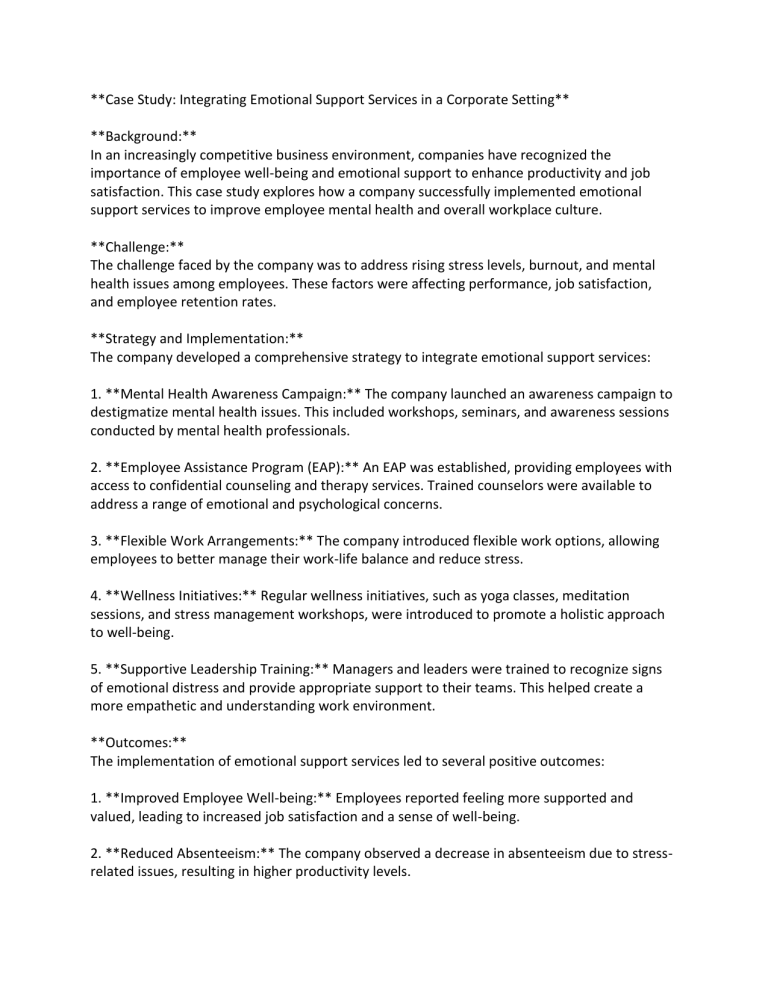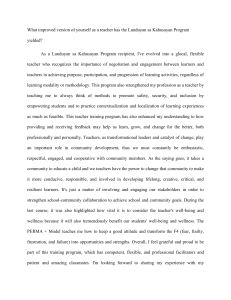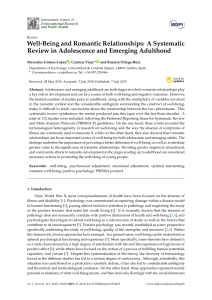
**Case Study: Integrating Emotional Support Services in a Corporate Setting** **Background:** In an increasingly competitive business environment, companies have recognized the importance of employee well-being and emotional support to enhance productivity and job satisfaction. This case study explores how a company successfully implemented emotional support services to improve employee mental health and overall workplace culture. **Challenge:** The challenge faced by the company was to address rising stress levels, burnout, and mental health issues among employees. These factors were affecting performance, job satisfaction, and employee retention rates. **Strategy and Implementation:** The company developed a comprehensive strategy to integrate emotional support services: 1. **Mental Health Awareness Campaign:** The company launched an awareness campaign to destigmatize mental health issues. This included workshops, seminars, and awareness sessions conducted by mental health professionals. 2. **Employee Assistance Program (EAP):** An EAP was established, providing employees with access to confidential counseling and therapy services. Trained counselors were available to address a range of emotional and psychological concerns. 3. **Flexible Work Arrangements:** The company introduced flexible work options, allowing employees to better manage their work-life balance and reduce stress. 4. **Wellness Initiatives:** Regular wellness initiatives, such as yoga classes, meditation sessions, and stress management workshops, were introduced to promote a holistic approach to well-being. 5. **Supportive Leadership Training:** Managers and leaders were trained to recognize signs of emotional distress and provide appropriate support to their teams. This helped create a more empathetic and understanding work environment. **Outcomes:** The implementation of emotional support services led to several positive outcomes: 1. **Improved Employee Well-being:** Employees reported feeling more supported and valued, leading to increased job satisfaction and a sense of well-being. 2. **Reduced Absenteeism:** The company observed a decrease in absenteeism due to stressrelated issues, resulting in higher productivity levels. 3. **Enhanced Team Collaboration:** A more open and empathetic work culture led to improved communication, collaboration, and team dynamics. 4. **Higher Retention Rates:** The company experienced higher employee retention rates as employees felt a stronger sense of loyalty and commitment to the organization. 5. **Positive Brand Image:** The company's efforts to prioritize employee emotional wellbeing contributed to a positive brand image, attracting top talent and clients who valued a supportive workplace culture. **Conclusion:** This case study highlights the significance of integrating emotional support services in a corporate setting. By fostering a culture of well-being, providing accessible resources, and prioritizing employee mental health, the company successfully addressed the challenge of stress and burnout, leading to improved employee satisfaction, productivity, and overall business success.







